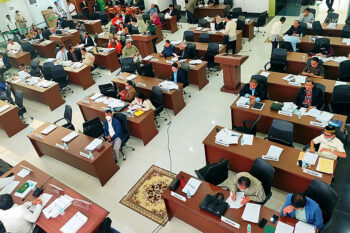DAVAO CITY (MindaNews/14 July) – The provincial government of North Cotabato is seeking investors for its growing palm oil industry but Gov. Emmylou Taliño-Mendoza wants a “local player” to take the lead.
In a press conference Thursday morning, Mendoza said they hope investors will spend in the province to put up a palm oil processing plant or refinery.
“We need investors and I want the local players to take a lead, spending money for this palm oil industry, so that we can produce our own cooking oil,” she told journalists here.
The province has almost 6,000 hectares of oil palm plantation. The bulk of it is located in the municipalities of Tulunan and M’lang with 1,365 and 1,021 hectares, respectively.
Palm oil is one of the potential investments that the province is supporting, according to Mendoza, who pointed out that the expansion of the oil palm plantation is ongoing.
“In fact, we continually provide venues for many interesting parties to visit areas in the province being facilitated by the Cotabato Provincial Investment and Promotion Council,” said the governor.
Palm oil is considered the world’s most productive oil product as its versatile composition is used for edible oils, food, chemical, cosmetic and pharmaceutical manufacturing.
As part of its effort to boost the palm oil industry, the provincial government will be hosting the 7th National Palm Oil Congress on August 25-26 in Kidapawan City.
Carrying the theme “Promote Peace, Economic Prosperity and Overcome Poverty thru Oil Palm Farming,” the congress is expected to draw 500 planters, investors, bankers, agricultural leaders, and representatives from the academe, government line agencies and local government units (LGU).
Upon learning that hosting the congress will cost more than a million, Mendoza said, “This investment is nothing compared to its magnificent return that include providing opportunities that will surely boost the economic industry of the province.”
“It is a manifestation of our commitment in pursuing strong investment policy,” said Mendoza, who reiterated that the provincial government’s support to the oil palm farmers in the province is continuing through the “plant now pay later program.”
Erwin Garcia, president of the Philippine Palm Oil Development Council, Inc. (PPDCI), said North Cotabato is one of the aggressive LGUs in the country developing palm oil.
“It’s one of the biggest in the region,” said Garcia, who hopes that a palm oil processing plant can be put up in the province but noted that it needs a lot of budget and investors.
It will be more cost-effective for investors to locate their plantations and milling plants in one area, Jesus Arranza, of the Philippine Coconut Authority (PCA), said in a press statement.
“The plantation and [processing] plant should be near each other to allow immediate processing to avoid deterioration of the quality of the oil,” he said.
Mindanao, particularly Caraga Region, has the highest potential for the palm oil industry because of the locality’s good quality soil type and fair weather condition, said the Mindanao Economic Development Council (Medco).
Domestic demand for palm oil is seen to rise five percent annually from 1995 to 2015, a study of the University of Asia and the Pacific showed.
In his article posted at the PPDCI website, Dr. Pablito Pamplona said that palm oil emerges as a potent tool in overcoming rural poverty in countries located in the tropics suitable for palm oil production.
He said that of the ASEAN countries in the tropics, “only the Philippines failed to use this tool, putting itself at the tailend of rural prosperity and overcoming rural poverty.”
Malaysia, on the other hand, is way ahead in the palm oil industry, making it on top of agricultural progress and prosperity among the members of the ASEAN, Pamplona added.
The Philippines government is seeking investors from neighboring countries, like Malaysia and Indonesia, to further develop the local palm oil industry. (Rico Biliran / MindaNews)







